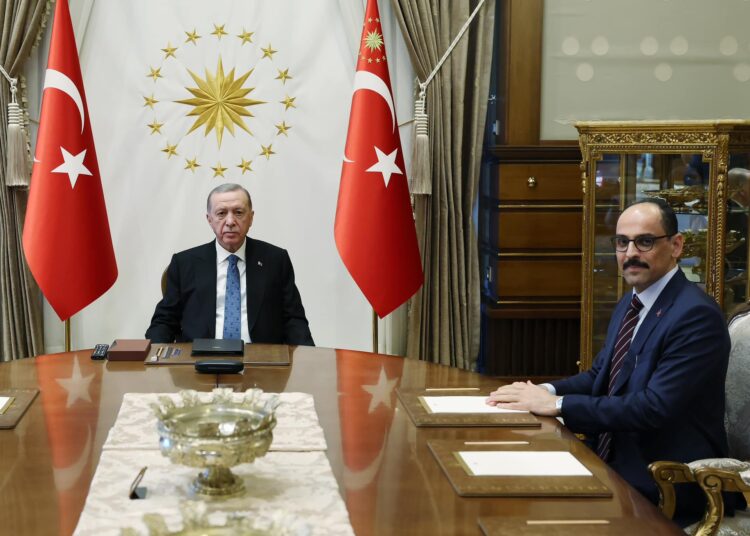Abdullah Bozkurt/ Stockholm
Turkey’s notorious intelligence agency, Milli İstihbarat Teşkilatı (MIT), secretly designated a Kazakh medical student as a national security threat without providing any evidence, effectively destroying his future and barring him from completing his medical studies in Turkey.
The revelation surfaced in an October 2024 ruling by Turkey’s Constitutional Court, which dismissed a complaint filed by Kazakh national Ramiz Islamov over violations of his fundamental rights. The court, widely seen as subservient to the intelligence service, sided with MIT despite serious due process concerns.
Islamov had lived in Turkey since 2010 and was only six months away from graduating from Bursa Uludağ University’s medical faculty when he was abruptly deported in early 2018. Turkish authorities claimed he was a “terrorist,” assigning him the G-82 security code, commonly used to label individuals considered threats to national security.
Terrorism charges are among the most frequently abused criminal allegations employed by Turkish authorities to profile unsuspecting individuals with no ties to terrorism or violence. These charges are routinely invoked to suppress legitimate opposition and to target critical journalists, academics and opposition politicians, all in an effort to reinforce the authoritarian rule of President Recep Tayyip Erdogan.
Foreign nationals living in Turkey are often swept up in this expansive intelligence apparatus, which increasingly relies on rising xenophobia to maintain Erdogan’s grip on power. Non-Muslim minorities, in particular, have been forced to leave the country after being secretly labeled as threats by MIT — without justification and without any attempt to present credible evidence.

On February 8, 2018, police detained Islamov based on MIT’s claim that he was affiliated with the Gülen movement, a faith-based group critical of President Erdogan’s government. Although he was released after giving a statement, the Directorate General of Migration Management (Göç İdaresi Başkanlığı, GIB) ordered his deportation the very next day. Within five days, he was put on a plane and expelled from the country.
On January 2, 2019, Islamov filed a lawsuit against the GIB, arguing that he had been wrongfully classified as a security threat and pointing to the fact that a criminal investigation into his alleged Gülen ties had been dropped. Still, the agency relied on a confidential MIT report in court, and the Ankara 1st Administrative Court rejected his claim, siding with the intelligence service.
An appellate court upheld that ruling on October 10, 2019.
The Constitutional Court’s ruling on Ramiz Islamov’s complaint aligns with the position of the Turkish intelligence agency:
While legal proceedings were still ongoing, Islamov married a Turkish citizen on September 9, 2019, further strengthening his ties to his adopted country. The couple later had a daughter who experienced health issues and underwent surgery. Islamov cited his family ties in an effort to bolster his legal case — but to no avail.
On December 8, 2020, Islamov filed a final appeal with the Constitutional Court, alleging multiple constitutional and human rights violations stemming from his covert designation by MIT and unlawful deportation. Yet the court — stacked with Erdogan loyalists — dismissed all three of his claims, which related to family life, education and due process.
Although Islamov argued that the entry ban had robbed him of his right to complete his degree just months before graduation, the court claimed his education had been only “incidentally” affected — not deliberately obstructed.
Perhaps the most alarming aspect of the ruling was the court’s handling of Islamov’s claim under Protocol No. 7 of the European Convention on Human Rights (ECHR), which guarantees procedural protections against arbitrary expulsion. Islamov contended that he had been denied access to an effective legal remedy since the intelligence report behind his deportation had not been disclosed, and its substance had not been examined by any court.

The ECHR is a binding legal instrument for the Turkish judiciary and is supposed to be treated on equal footing with the articles of the Turkish Constitution. However, the Erdogan government frequently ignores the ECHR and fails to enforce rulings from the Strasbourg-based European Court of Human Rights (ECtHR), which has often found Turkey in violation of fundamental rights
Turkey’s Constitutional Court — strangely considered an effective domestic remedy by the ECtHR before cases can be referred to it — often turns a blind eye to human rights violations and aligns itself with the Erdogan government. As a result, the Constitutional Court declared Islamov’s application inadmissible on all grounds and ordered him to cover the legal costs.
The case shines a light on the growing influence of MIT’s opaque security assessments and the sweeping legal immunity afforded to state actions taken under the guise of national security — even when they violate basic rights such as education, family unity and due process.
Islamov’s ordeal is far from unique. Over the past decade, Turkey’s intelligence agency has led a vast campaign of profiling foreign nationals including journalists, academics, clerics and human rights advocates, frequently accusing them of terrorism or espionage without evidence and branding them as security threats.
Since 2016, when MIT orchestrated a false-flag coup attempt that enabled Erdogan to consolidate imperial-style presidential powers, hundreds of foreign students have been detained, interrogated and deported on spurious charges.
Meanwhile, thousands of judges and prosecutors were purged and arrested on fabricated charges, allowing Erdogan to stack the judiciary with loyalists who now shield the executive from accountability.
Turkey’s intelligence agency has become a central pillar of Erdogan’s authoritarian regime. With complete immunity from prosecution and no legislative or judicial oversight, MIT routinely targets foreigners on suspicion alone, without needing to prove any wrongdoing. MIT-led fabricated investigations are later covered by the state-controlled media to amplify fear of foreigners, who are portrayed as harboring ill intentions toward Turkey — when in reality, this is far from the truth.












